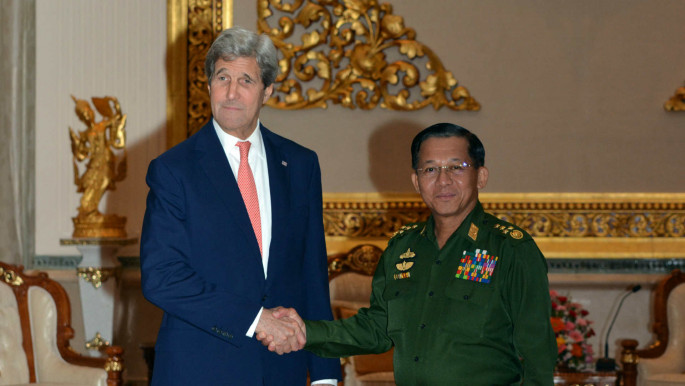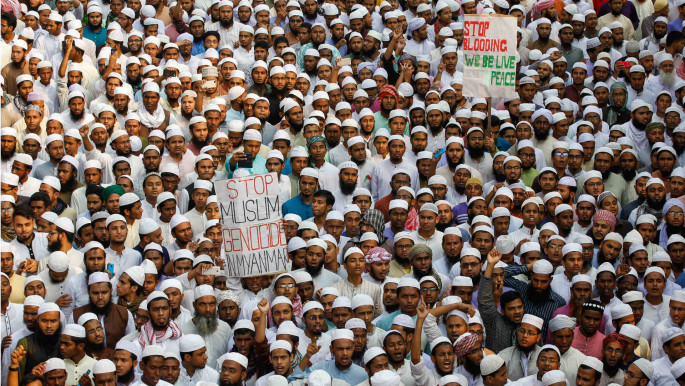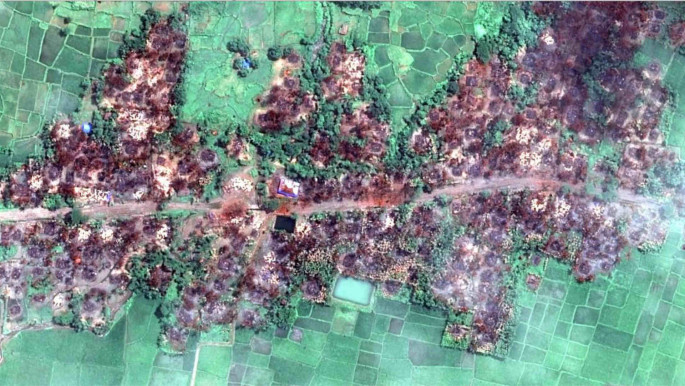Myanmar's persecuted Rohingya: Who's really to blame?
UN-sponsored aid camps in neighbouring Bangladesh have received thousands of refugees fleeing the Myanmar army's scorched earth policies, the UN's refugee agency said.
"These people have been walking for days. They likely have not eaten since they left their homes," said UNHCR spokesperson Vivian Tan.
"The existing refugees have taken in the new arrivals into their homes," she added
Reports have surfaced of the Myanmar government banning aid deliveries to Rakhine, while satellite imagery of entire villages burning has also emerged.
To end these atrocities, some experts have argued that targeted sanctions, rather than general criticism, are the best way forward to effectively help the ethnic minorities of Myanmar.
The Burma Campaign is a UK-based organisation that works to raise awareness of human rights abuses in Myanmar and how to stop them. It believes the international community needs to focus its attention on the Myanmar military itself to stop the violence.
"There is one person in Burma [Myanmar] who has the responsibility for what's happening and has the power to stop it and that is Min Aung Hlaing, the head of the military," said Mark Farmaner, director of the Burma Campaign UK.
"But at the moment all the focus is on Aung San Suu Kyi [the de facto leader of Myanmar] and none of the focus is on him."
General Hlaing is the military man who had postponed a peaceful transition from military dictatorship to democracy. He is the man in charge of the troops, the man thought to have commanded soldiers to enter Rakhine in the first place - yet he receives little to no international criticism.
The UK's foreign minister, Boris Johnson, made headlines on Sunday after he criticised Aung San Suu Kyi for the allegations of ongoing human rights abuses.
"Aung San Suu Kyi is rightly regarded as one of the most inspiring figures of our age but the treatment of the Rohingya is alas besmirching the reputation of Burma," Johnson said.
 |
There's no one single thing that's going to persuade Hlaing to change |  |
But some experts argue that Johnson's criticism was misplaced and pressure should instead be placed on General Hlaing.
 |
|
| [Click to expand] General Min Aung Hlain with US State Secretary John Kerry |
Instead of criticism, Hlaing has instead received nothing but the red carpet. Foreign governments have been tripping over themselves, trying to gain access to Myanmar’s virgin markets and untapped resources since the economy opened up to capitalism for the first time in 2013.
Hlaing has reaped the benefits of this flattering. He enjoyed a week-long visit to Italy, Austria and Germany in May, visiting military equipment factories only days after the EU’s arms embargo against Myanmar expired on April 30. His red-carpet tour of arms dealers and foreign investors clashing with simultaneous criticisms of alleged war crimes against the country’s ethnic minorities.
"There's no one single thing that's going to persuade Hlaing to change, it's a hundred small things - it's about adding straws to the camel's back," said Farmaner.
"He loves his international trips - going abroad and luxury dinners. He's posting it on his Facebook all the time."
Hlaing's trips abroad could come to an end - if enough pressure were placed on individual governments. Lobbying government indirectly for a vague goal of ending human rights abuses is ineffective, and targeting the perpetrators and asking your government to act decisively works better, according to independent experts.
Arms Embargo
And these targeted sanctions could happen. Canada's Parliamentary Subcommittee on International Human Rights recently issued a report which called for just that. The report, titled "Sentenced to a Slow Demise", calls for a formal response within 120 days.
Change will only come if enough pressure is applied on the right areas by a number of international governments, they say and that can only happen if politicians feel that direct pressure.
"Ideally we need a UN-mandated arms embargo - countries can individually decide to impose their own embargos but it would require governments like Turkey and the United States - countries that have expressed support for the Rohingya to mobilise international support," said Farmaner.
 |
|
| Large protests have broken out around the world against the treatment of Myanmar's ethnic minorities [source: AFP] |
Many argue the European Union is in particular need of lobbying over Myanmar. Until last year, the UN published an annual review of the human rights situation in Myanmar. This has now ended while various EU members have started to directly train the Myanmar military and police responsible for the human rights abuses in question.
Pakistan too, a majority Muslim state itself, was one of the first countries to respond to allegations of violence against Myanmar's Muslim minority - expressing "serious concerns". Yet despite this official condemnation lies an implicit support for the military. Pakistan, partnered with ally China, signed an agreement in 2015 to export millions of dollars worth of fighter jets to Naypyidaw.
India is one of the biggest cooperators with the Myanmar military. General Hlaing received the warmest of warm welcomes ahead of eight days of luxury in New Delhi in July.
India has been a major supporter of the Myanmar military since 1993. It exports millions of dollars of weapons to the country to contain the perceived geopolitical spread of India's rival, China.
Shortly before violence broke out in Rakhine, New Delhi announced plans to deport thousands of Rohingya refugees back to Myanmar - a process one human rights activist called "legally, procedurally and practically impossible".
According to human rights NGOs including Article 19, these countries in particular need to stop supporting Myanmar's military and they must be shamed into action.
Direct action is never easy, but those following the situation in Myanmar closely believe merely criticising the government of Aung San Suu Kyi is pointless and will not effect real change in the country without sanctions and pressure against the country's military.








 Follow the Middle East's top stories in English at The New Arab on Google News
Follow the Middle East's top stories in English at The New Arab on Google News


